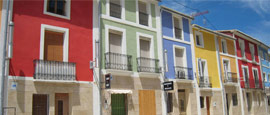Dating from the 9th century and Moorish in origin, the Castillo de Santa Bárbara is the most emblematic construction in Alicante. Located on the summit of Mount Benacantil at 166m (544ft) above sea level, the castle is built in several fortified levels. On its slopes, archaeological remains from the Bronze, Iberian and Roman ages have been found. The rooms of the castle were built between the 16th and 18th centuries. The castle also features a museum showcasing archaeological remains from around the city. Guided tours are also available.
Things to see in Alicante
Tourist offices
Address: Rambla Méndez Núñez 41, Alicante, Spain
Tel: +34 96 520 0000.
Opening Hours:
Mon-Fri 1000-1800, Sat 1000-1400.
Other tourist offices are open at the railway station (open Mon-Sat 1000-1400 and 1600-1900, Sun 1000-1400), and San Juan Beach (open from 1 Jul-31 Aug; Mon-Fri 1030-1430 and 1630-1930, Sat-Sun 1030-1500).
www.alicanteturismo.comA fine example of baroque civic architecture finished in 1760, Alicante's Town Hall is flanked by twin towers. Of interest inside are the Blue Room, the Plenary Room and the chapel. On the first step of the stairway on the first floor is a small metal disc indicating sea level, which is used as a reference point for measuring the height above sea level in all other parts of Spain. A new neighbouring building contains an exhibition of archaeological remains discovered in the area.
This is the oldest church in Alicante and was built in the gothic style between the 14th and 16th centuries over the ruins of what was once the main mosque during the Moorish occupation. The basilica had to be rebuilt following a fire in the 15th century. Its baroque facade is topped by two asymmetrical towers – one built in the 14th century and the other in the 18th century. Highlights include the doorway with its image of the Virgin Mary by sculptor Juan Bautista Borja, an 18th century rococo altar and a Valencian baroque organ from 1653.
Built in the Renaissance style of the Spanish architect Juan de Herrera, this is one of the most important buildings in the Old Town. Its floor plan is in the shape of a Latin cross. Of special interest inside are the cloister, adorned with baroque doors, the altar, the communion chapel and the 45m-high (147ft) dome. Below the cupola is the Capilla de la Comunión communion chapel, which is considered to be one of the most beautiful examples of Spanish baroque. The interior has recently been restored to celebrate Valencia’s artistic heritage.
This museum explores the evolution of one of Alicante’s most important festivals, the Hogueras de San Juan bonfire celebration held in June. Visitors can see collections of ninots indultados (the effigies that escape the flames), mock bonfires and typical costumes, as well as an audiovisual hall showing clips of previous festivals.
In the historical centre of the city, Alicante’s Museum of Contemporary Art is located in front of the Basilica of Santa Maria monument. It occupies space inside the city’s oldest surviving civil building, a former jail that dates back to 1685. Today the museum consists of three permanent collections of approximately 800 pieces of modern art.
Situated in the former Hospital de San Juan de Dios, this Alicante museum contains an important collection comprising pieces from Palaeolithic times to the Middle Ages, offering an educational experience.
An 18th-century building, located in Alicante's Calle Gravina, MUBAG houses the main artforms from the Alicante area, from the Middle Ages up to 1920. The collection is put into context using period furniture and textiles.
A fascinating collection of work exploring the enduring Spanish tradition of constructing model nativity scenes. Housed in a traditional Alicante home, typical of the city’s Old Quarter, this curious museum boasts not only Christmas dioramas from Spain and the local work of the Association of Belenists of Alicante, but also a collection from around the Western world.
Do you have any Feedback about this page?
© 2026 Columbus Travel Media Ltd. All rights reserved. No part of this site may be reproduced without our written permission, click here for information on Columbus Content Solutions.








 You know where
You know where